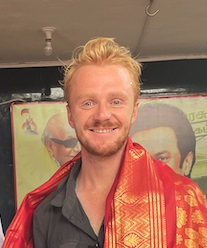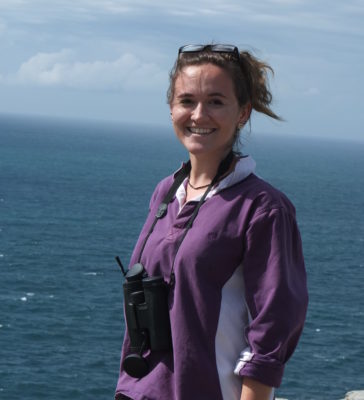
Abhishek Dixit
Current Employer/Organisation Name
Falmouth Exeter Plus
What have you been doing since leaving Exeter, and what are you doing now?
While studying at the University of Exeter, I worked part-time as a cleaner with Falmouth Exeter Plus (FX Plus), the facilities and services provider for Falmouth and Exeter universities at their Cornwall campuses. During a random conversation, in the final months of my course, my manager asked me to look at a new role in FX Plus that she believed was related to my MSc. Lo and behold, I found myself frantically applying for the role of Biodiversity Project Officer! I began my work in September 2022. As a Biodiversity Project Officer, I have been tasked with formalising, executing, and promoting actions for conservation on the Penryn and Falmouth campuses. Collaborating with sustainability teams, academic advisors, and student groups, I am creating a Biodiversity Action Plan that will help monitor and enhance biodiversity on campus grounds. To ensure that both universities (Falmouth and Exeter) meet Biodiversity Net Gain targets set forth in the UK’s Town and Country Planning Act (1990), I am mapping and measuring habitat gain and loss due to development, designating spaces for nature on campus, and reinforcing internal policies for tree/hedgerow protection, invasive plant control, and much more. I work closely with our grounds and gardens team to enhance our habitats via tree and wildflower planting, invasive non-native plant removal, and ancient/veteran tree management. I am organizing campus wildlife surveys with student groups such as the Ecological Society (for monitoring butterflies, birds, wildflowers, etc.), the findings of which are submitted to relevant national wildlife censuses. To raise awareness about our work and the importance of preserving a mosaic of habitats, the team and I engage students, staff, and the local community in conservation volunteering sessions, nature walks, collaborative projects, exhibitions, and through content on social media (do follow @fxgrounds on Instagram!).
Why did you choose this career? And what do you enjoy most about your work?
Nature has captivated me for as long as I remember. Ever since my first visit to a Tiger Reserve during my school years, my heart has been set on understanding, experiencing, and protecting the natural world. Although my passions span from conservation to music, filmmaking, and adventure sports, after years of contemplation, I found conservation to be my ikigai (a Japanese concept – a ‘reason for being’), a perfect balance of what I love, what I’m good at, what I can be paid a sustainable wage for (in bold!), and what the world needs. It is a major reason for me to get out of bed every morning! I love that I can learn about the natural world through my work and share this knowledge with people who are not aware of the world hidden in plain sight!
Please tell us if you were a member of any societies, groups or sports clubs?
I was a member of FalClimb (the climbing society) and the Songwriters’ Society. I also participated in a sea swimming trip with the Sea Swimming society.
What did you enjoy most about your programme and what was the biggest highlight?
The highlights of the course were my fieldtrip to Scotland and my time on field for my research project. Visiting land managers in Scotland who had varying opinions on rewilding was a very humbling and grounding experience. It provided me a true perspective of conservation in the UK. I was able to explore the beautiful, dramatic coastal landscape of Cornwall as I surveyed bats for my dissertation. I truly experienced the life of an ecological researcher, having collected my own data and seeing it turn into a scientific paper, with the hope to unravel mysteries of the natural world! A standout module that has shaped me as a conservationist is ‘Planning and Leading Conservation Projects’ with Jamie Copsey. A lot of the team building, facilitation, and workspace behaviour skills from the module have been very handy for me to be able to create a voice for biodiversity in a corporate space.
Why did you choose to study at Exeter?
I have always been a very ‘hands-on’ learner. I tend to understand concepts better when I witness them in a real-life situation. I was pulled towards the MSc Conservation and Biodiversity course due to the various opportunities it offered for applying ecological and statistical concepts in the field.
What skills and experiences have been most useful for your career?
Through my work as a Biodiversity Project Officer, I have realised that interpersonal skills go a long way for making a change. It does not matter if you don’t know every single plant species off the top of your head, or if you can’t remember every ecological concept in the books. Being able to liaise with people that have varying opinions, assessing challenges through an interdisciplinary lens (dabbling in communications, finance, creative media, etc.), and most importantly, being patient with my peers and superiors has helped me develop long-term solutions for protecting biodiversity. Oh, and GIS very important! Most upcoming jobs related to Biodiversity Net Gain require you to be able to spatially analyse habitats, measure their area and quality, and design sustainable ecosystems.
What advice would you give to a current student who wishes to pursue your career?
From my time at the University of Exeter and having gone through the process of finding a job, I would advise new students pursuing a similar career to engage with other people, build strong relationships both inside and outside the MSc. Do not be afraid to put yourself out there. This is especially important for international students who are trying to make a life for themselves so far away from home. A wide network of friends and colleagues keeps you motivated during your studies and makes you privy to the latest opportunities in the conservation workforce. Afterall, it was a random conversation with my cleaning manager that got me the Biodiversity Project Officer role!
What are your plans for the future?
Having developed a deep understanding of the ecology of the UK, current threats to UK biodiversity, and laws that come into play here, I hope to work for a couple years in the UK. I am looking to lead on discussions for Biodiversity Net Gain and be on the ground, monitor biodiversity, planting trees and wildflowers, and raising awareness among local communities.

